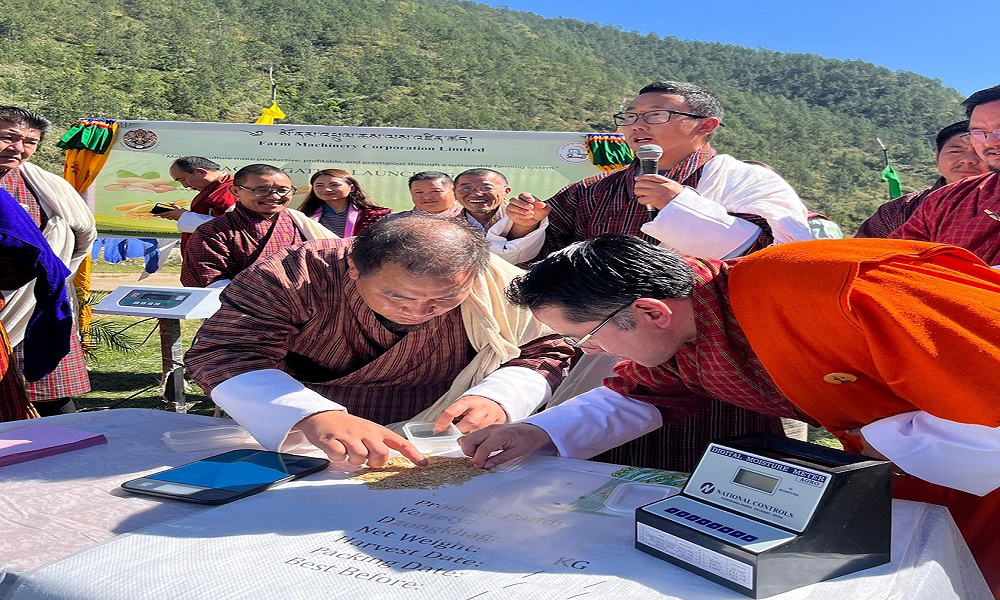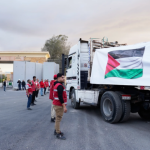
Aggregation program in Bhutan could be a game changer for farmers and the agricultural economy
Dophum, a 42-year-old farmer from Guma gewog in Punakha, planted Kamtey rice this season. She plans to switch to high-value varieties like Tan-Tsering and Nabja next year. This shift is encouraged by an aggregation programme launched by Farm Machinery Corporation Limited (FMCL) yesterday at Dzomlingthang in Guma gewog.
The programme aims to strengthen Bhutan’s agricultural sector by consolidating and distributing essential crops, providing farmers with better market access and support.
The programme was inaugurated by the Minister for Agriculture and Livestock, Younten Phuntsho, with Members of Parliament, government officials, local leaders, and farmers also in attendance.
The aggregation programme, part of the Price Guarantee Scheme (PGS), is funded by the Economic Stimulus Plan (ESP) and aims to provide farmers with a stable market by collecting and processing key crops nationwide.
Under the PGS, nine priority crops are identified, six of which—soybeans, groundnuts, rice, wheat, maize, and quinoa—are managed by FMCL.
The scheme’s aim is to ensure that farmers receive minimum prices for these essential crops, protect them from sudden price drops and guarantee fair compensation. These priority crops will be made available to domestic consumers at affordable rates.
FMCL has been tasked with aggregating, collecting and distributing these products to ensure stable pricing and market access.
To manage this, the government has tasked FMCL with the role of aggregator, responsible for overseeing the collection and distribution of these products.
This year, FMCL will focus on aggregating grains such as maize, wheat, quinoa, and rice from Punakha. Starting next year, the programme will expand to include all six grains, collected from across all 20 dzongkhags.
A similar programme will be introduced in other dzongkhags.
The target gewogs in Punakha include Guma, Kabjisa, Dzomi, Shengana, and Talo. With an expected 500 participants, the programme aims to collect 4,300kg grains.
Wangda Dukpa, chief executive officer of FMCL, emphasised that the program is designed to support farmers by offering a reliable market for their grains.
“This initiative encourages farmers to boost production, knowing they can sell their yields with the assurance of market demand. For now, we are focusing on Tan Tsering and Nabja rice due to their popularity and volume,” he said.
He explained that the initiative also aims to enhance both production and productivity for farmers, while making domestically produced agricultural products available to consumers at affordable prices.
The CEO further outlined that specific criteria have been set for purchasing grains from farmers. These grains must pass a moisture test to ensure they are properly dried, as well as a purity test to verify that no foreign materials are mixed in.
He added: “Farmers are encouraged to bring freshly harvested grains.”
Currently, FMCL operates three designated warehouses located in Bajothang (Wangduephodrang), Chhuzagang (Gelephu), and Phuntshothang (Samdrupjongkhar). These warehouses serve as key collection and consolidation points for crops.
These facilities play a vital role in streamlining the aggregation process, ensuring efficient post-harvest handling and distribution to local markets.
FMCL also plans to establish similar warehouses in Bumthang, Mongar, Samtse, Paro, and Trashigang.
Regarding pricing, the CEO stated that FMCL has set the grain prices after consulting with farmers and other relevant stakeholders.
“This collaborative approach ensures that the prices are fair and reflect the needs of both producers and consumers,” he said.
The programme aligns with the country’s priorities by promoting a resilient and locally sustainable agricultural sector.
Many farmers who attended the event expressed enthusiasm for the programme. With the paddy harvest season underway, some are especially excited about the opportunity to sell their produce, anticipating the benefits of the program’s market stability.
The programme has sparked optimism among local farmers, as it promises both a reliable market and financial security.
Dema, a 42-year-old farmer from Guma, voiced her support for the initiative, noting that it would help address many challenges they face, such as the high cost of transporting produce to the market by taxi and the difficulty of finding buyers.
“I believe the programme will alleviate these burdens by providing a more accessible and reliable platform for selling our crops,” she said.
By consolidating crop production, FMCL addresses several challenges that farmers face, including inconsistent pricing, inadequate storage, and high post-harvest losses.
Aggregation enhances food security and creates a stable market environment that benefits all stakeholders, from farmers to consumers.
The programme also helps reduce Bhutan’s reliance on food imports, promoting greater self-sufficiency in agriculture.
Through these efforts, FMCL plays a crucial role in strengthening Bhutan’s agricultural economy and ensuring long-term sustainability.
Designed to benefit various segments of Bhutan’s agricultural sector, the program provides farmers with access to a stable market, consistent income, and essential storage and processing facilities, all while being supported by the PGS.
Consumers will benefit from a reliable supply of high-quality, locally sourced food products. By aggregating and securing markets for priority crops, FMCL is contributing to the development of a more resilient agricultural economy.
This not only supports farmers’ livelihoods but also strengthens Bhutan’s food security and economic stability.
Founded in 2016, FMCL has played a pivotal role in mechanising agriculture in Bhutan.
Over the years, its focus has shifted to include crop aggregation and machinery manufacturing, aligning with its mission to make agriculture more productive, profitable, and prestigious.






![Pakistan accuses the TTP of carrying out attacks on its territory and the Afghan Taliban government of harbouring the group [File: Fayaz Aziz/Reuters]](https://asiandiplomacy.com/wp-content/uploads/2025/10/2023-02-27T041341Z_1777986366_RC2O7Z9GI1FB_RTRMADP_3_PAKISTAN-BLAST-POLICE-1760256429-150x150.webp)